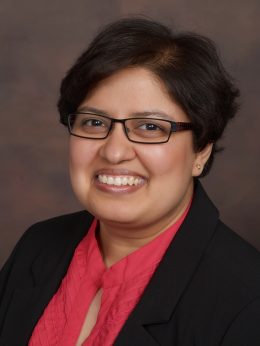At the prospect of meeting her role model, Rushita Bagchi is at a loss for words. Selected through a national competition to attend the prestigious Lindau Nobel Laureate Meeting this summer, Bagchi has the chance to interact with top scientists from around the world, including Elizabeth Blackburn, 2009 winner of the Nobel Prize in Physiology or Medicine.
 Rushita Bagchi, PhD, has been with the university since 2015.
Rushita Bagchi, PhD, has been with the university since 2015.
Bagchi, who received her PhD from the University of Manitoba in cardiac pathophysiology, said she hopes she will be able to calm her excitement enough to gain insight from the renowned woman scientist. Bagchi recently spoke with CU Anschutz Today about her path to the notable meeting invitation. She has worked in Dr. Timothy McKinsey’s lab on the CU Anschutz Medical Campus as a postdoctoral fellow in the Division of Cardiology since 2015.
What do you study, and what do you like most about it?
Currently, I am researching the epigenetic regulation of cardiometabolic disease, with a special focus on chromatin modifying enzymes known as histone deacetylases (HDACs). This area is fairly lesser explored than broad cardiology. Any novel findings from this area of research have the potential to pave the way for the development of new therapeutics to treat patients diagnosed with diabetes and hyperlipidemia and cardiovascular disease associated with these conditions. The translational nature of this work is very exciting and keeps me very engaged.
What is the Lindau Nobel Laureate Meeting?
It is a one-of-a-kind opportunity for top trainees in the world (under the age of 35) to network and learn from the experts in the field. The annual meeting is conducted in different categories, just like the Nobel Prize categories. This year's meeting in June is in the area of Medicine and Physiology. The top 600 trainees from 84 countries have been selected to participate in this meeting and interact with over 40 Nobel laureates. This is the best platform to build networks and lay the foundation for future collaborations. Mostly importantly, I think this is the best opportunity one can have to get to know the world leaders in science better and listen and learn about their academic and personal experiences.
What is the application process like?
It starts with a nomination from a partner institution in a country, which may choose to select its nominees through competition, merit or both. The nomination letter is just one of the many components of the application process. In addition, the nominees are asked to provide detailed biodata, their significant contributions to the field of science, recognitions and awards and what motivates them to pursue scientific research. A scientific committee carefully assesses thousands of applications from nominees worldwide and selects the top 500 or so individuals to participate in the meeting.[perfectpullquote align="right" bordertop="false" cite="" link="" color="" class="" size=""]
“I think this is the best opportunity one can have to get to know the world leaders in science better and listen and learn about their academic and personal experiences.” ̶ Rushita Bagchi, PhD
[/perfectpullquote]
What did you think or do when you heard you were chosen?
I received an email from the meeting organizers very early morning on Feb. 27, which is also my dad's birthday. It took me a little while to process what had just happened. I called up my husband in Canada and my parents in India immediately to inform them about my selection. I also passed on the news to my current mentor, Dr. Timothy McKinsey, and my PhD mentor, Dr. Michael Czubryt. It was very exciting, and surreal!
What are you looking forward to the most?
I am looking forward to networking opportunities and learning from the experts. I am especially excited about being able to meet Dr. Elizabeth Blackburn, who received the prize for the discovery of the enzyme telomerase. I have always looked up to women scientists, and she is one of my role models.
What do you think you’ll say or ask when you meet her?
Honestly, I don't know how I will react when I meet her in person. I will probably be at a loss for words at the first glance, and then hopefully will be able to introduce myself and start a conversation. I will surely ask about her experience and path she took to becoming a top woman scientist and especially her advice for aspiring women scientists.




